Whoever has said leave the past in the past, doesn’t know JOANNA HOGG. With THE SOUVENIR, her fourth feature following “Unrelated”, “Archipelago”, and “Exhibition”, Hogg revisits her own past with this emotionally charged visual memoir through time, catapulting us into the emotional fray of a woman trying to discover (or invent) herself and her passions. Hogg never keeps us at arm’s length but rather, invites us into the mindset of Julie, a 20-something film student, fascinated by and falling in love with a seemingly worldly Andrew, while trying to distance herself from her upper-class life of privilege as she attempts to understand the struggle of poverty and the working class through a film project. Fascinating is that while Julie has spent her life at arm’s distance from the real world, Hogg immerses us in it.

Exploring themes of art versus life, first love, passive-aggressive toxicity, and a muscle memory look back to being in your 20’s in the 1980’s, Hogg delivers a film that is steeped in authenticity and intimacy, making one feel as if a fly on the wall, silently privy to Julie’s emotional quest to find herself and define her life, presumably through boyfriend Anthony. As almost every woman, and man, watching will attest, the handwriting is on the wall that Anthony is not what Julie perceives him to be. His veneer is thin, but Julie’s almost desperation for love clouds what should be a developing filmmaker’s eye. The intensity of the relationship between the two is palpable, often fraught with anxiety and even fear, but it is impossible to look away. The more emotionally intimate the film becomes, the more you want to turn away almost in embarrassment, but can’t. You look deeper and listen harder.
Compounding this intensity is the fact that Hogg has cast Tilda Swinton as Julie’s mother. Making her true cinematic debut as Julie is Swinton’s own daughter, Honor Swinton Byrne. (Honor was previously briefly seen 10 years ago in “I Am Love” with her mother.) Their mother-daughter connection leaps off the screen and adds further gravitas to Honor’s performance. Honor is revelatory. Infusing Julie with a confused sensuality and naivete, she makes your heart ache as we suspect Anthony’s true nature and Julie exists with blinders on and in denial. This emotional memory of Hogg’s hinges on the performance of Tom Burke as Anthony and Burke delivers in spaces. Riveting performance. So intense and so detailed is the relationship between Julie and Anthony that one wonders where Hogg’s own memories and experiences begin and end.
Naturalistic in its tone and visuals, bringing this 1980’s world to life though falls on the work of production designer Stephane Collonge and cinematographer David Raedeker. Their collaborative work is exemplary, particularly given that the apartment in which Julie resides is built from the ground up and mirrors Hogg’s own apartment at that time. Photos and journal entries not only helped inform the characters but the production design and cinematography. Images seen through the windows are actually slides taken by Hogg back in the day capturing her own views. Opting for a nostalgic grain, Raedeker imbues the film with period perfection, while creating an almost shroudlike pallor that adds to the emotional weight of Julie’s crossroads in life. Outstanding is a dreamlike Venice sequence that dazzles. Completing the immersion is sound design, electing for no instrumental score but to celebrate the ambient sounds of life punctuated by and the film’s period-perfect needle drops.
I spoke at length with JOANNA HOGG discussing the film and the dissection of life that time and distance have allowed her, melding fact with fiction to capture her emotional impressions of the time rather than accuracy, and bringing it to the big screen. . .
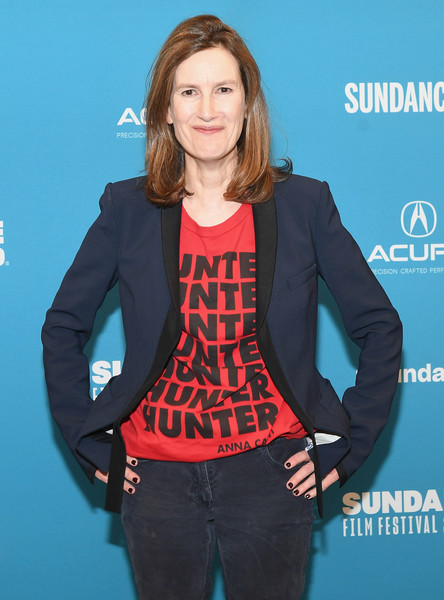
The first thing that struck me with THE SOUVENIR is the cinematography. I am enamored by it and the work of cinematographer David Raedeker. The entire look of the film, the gauzy filmic look of almost a Greta Garbo-esque look where you are looking at something but there’s a little something that is not quite as perfect as it was or as authentic as it was, there’s always a little bit of gauze to soften the memory or what’s happening. I just love that effect of the deeper we get into the character Julie and her blindness to Anthony and really what’s going on with him. She’s as addicted to him as he is addicted to drugs.
Yes. I like your way of looking at it.
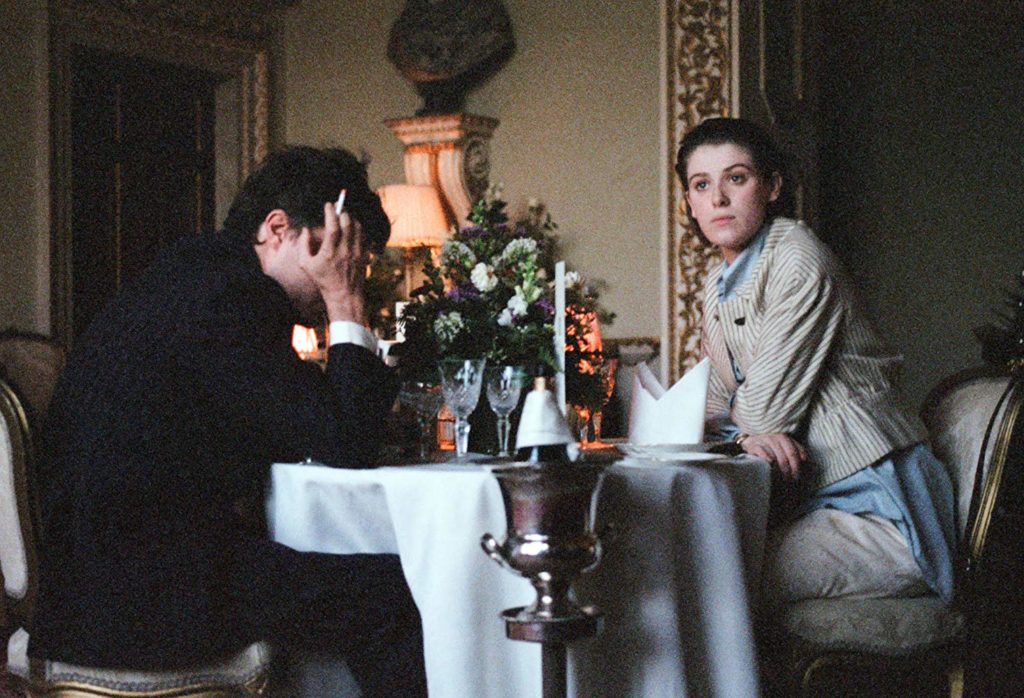
Just exquisite. I know much of this film is based on your own experiences, so I’m curious where, for you as a creator and as a filmmaker, where do you draw the line in being completely accurate and perhaps letting memories and nostalgia take hold and soften things, or where do you insert fiction?
Well, it’s in a way hard to see now where reality begins and fiction begins and in a way I was really interested in that melding of the reality. I wanted that to be part of the film. I haven’t looked at the film in its entirety in a while because I tend to work very intensely on a film, and particularly with THE SOUVENIR, obviously I’m watching it a myriad of times and working on it, then I don’t look back. My sense is that it’s all really memory for me. Actually, I find it a little confusing myself what actually happened now and what is fictionalized in the film because it was a very powerful thing that we did, which was recreate an apartment that I lived in at that time. And by recreating it, by reimagining it, bringing it to life again, it brought back a lot of memories of that time, which I had thought I lost. So it was an interesting thing of bringing something to life again and then placing what comes up from that.
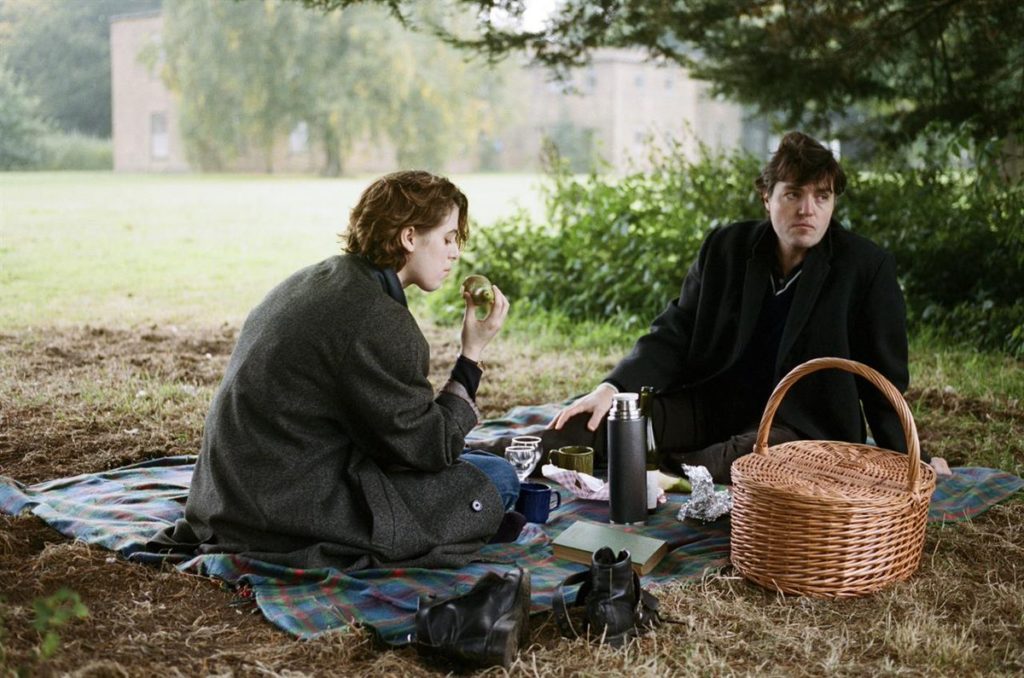
You do it so beautifully, but also with such naturalism. A story like this is one I can see so many filmmakers who, yes, they would craft a story like this, full of dialogue, and they’d do setups, and then just turn it into something that felt forced, whereas this feels so natural they way it unfolds.
I’m really happy you saw it like that. I’m sure that’s a lot to do with the way that I work. I’m in a way not forcing anything because I supposed living many months, even years, digging around in my own memory and creating a story out of these memories. In a way there was a story already there that I experienced which is not unlike what Julie experiences. But then in the process of making the film, I opened doors to my collaborators and I allowed them to bring some of themselves and their instincts into the film too so that the thing really lives and breathes in a very alive way. I’m not interested in writing a screenplay and then have everyone play out that screenplay with exactitude. I want to bring other things, experienced things that I don’t know without writing, I don’t know what will happen. Sometimes there is a tension between what I’ve remembered and then what’s happening in front of me. And then there’s the choice I make. Do I work hard for it to be precisely like that memory, or do I use the life that’s in front of me, which is the performers that I have, some of whom haven’t had any experience in front of the camera before? Do I bring them into it and allow their lives to somehow seep into the film? I think that’s what makes it feel alive in that way you described.
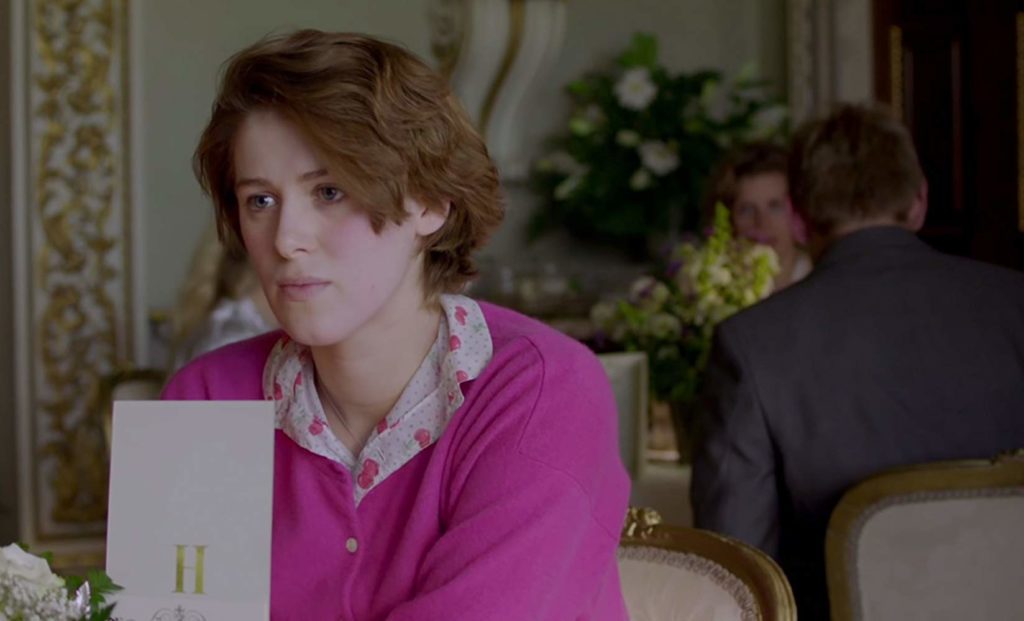
Your casting of Honor [Swinton-Byrne] as Julie, is absolute perfection. She brings this wonderful, wide-eyed naivete, where she is determined, she wants to make a film and she wants to do this, but at the same time she is naïve as to the ways of the world and life out beyond, the cloistered upper-class home of her family. And the way she portrays Julie as all of a sudden you are out there in the world and you are blind to so many things when you’re that young and just going out in the world the first time. So emotionally effective and resonant.
Well, I was interested in thinking what it’s like to be in your early twenties. You’re so influenced in a way by what’s around you, particularly when you’re feeling, as I remember myself feeling, very uncertain about life and very uncertain about the future, but craving certainty in others. That certainty that Anthony has is incredibly seductive to her. And she also feels that he understands her. When he says “You’re lost, you’ll always be lost”, she feels he’s caught something of her, something that maybe she can’t see herself. Then it’s very easy to be led by that confidence and that insight.
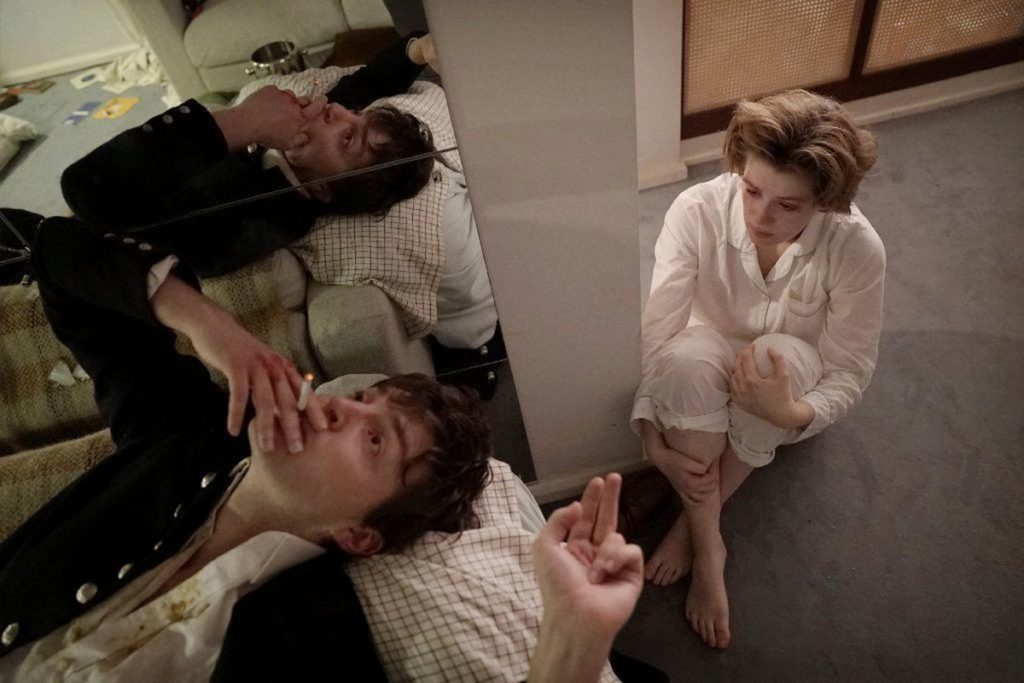
So beautifully done. And of course, by casting Tom Burke, you can sense as you watch, as an audience, you can sense the danger of him. He has a very dangerous, superficial edge. You can tell that this alleged polish that he has, it’s for show. There’s a veneer there, but Julie doesn’t see it. The way Tom and Honor play against each other is so well executed, so well done. You feel her naivete come to life when it comes to Anthony, and you feel him knowing he can take advantage and get a free ride with her because she’s so enamored. And the way they play it and the way you let them run with the camera, you widen out your shots, you’ve got longer shots. So we see the world around them but we are still so focused on them. It’s wonderful.
Thank you. Tom Burke is an incredible actor and he went to some depth to tap into that character. He’s got an amazing, very strong screen presence. He hadn’t done too much cinema work and he came from quite a lot of television and lots on the stage as well, but I think he is incredible on the big screen. I cast him quite early in the process when I first started looking for an actor to play Anthony and I specifically wanted an actor, because I feel Anthony is acting in a way. I often cast my actors as well but in the case of his character, it’s exactly that he is an actor. When I met Tom very early on in the process, he just struck me. There there was some connection that he had with the original man that I knew back in the early 80’s. So there was something about him that reminded me of this other person, but it was more the process that Tom went through to create a character, to get in touch with the character, [that] is very detailed and very deep. He went on a journey with Anthony. There’s something almost other-worldy about what he does.

I would be remiss not to ask you about your flawless selection of needle drop songs throughout this film. The songs you have selected are absolute perfection. When did you realize the kind of songs that you’d want to insert, and how did you go about picking the ones that you did select?
Well, some of those songs I knew I wanted, probably a couple of years ago when I was still writing the story. I knew that I wanted Joe Jackson in there. I knew that I wanted The Specials, The Fall, Robert Wyatt. Actually, the first piece of music that was an absolute necessity to have was the Bela Bartok opera ‘Bluebeard’ because the original person on whom Anthony is based, that was his favorite opera and actually in a way the connection with the story of Bluebeard wasn’t what at first I wanted the music for, but then it sort of thematically connects a little bit – Judith and Bluebeard, and Julie and Anthony. So a lot of the music was there in the writing right from the beginning. Then, of course, it can be challenging to get the rights to the music you want. We have some wonderful supervisors working on the film and they work very hard to make sure I got the music that I wanted. It was incredibly important to me having made three films before this one with almost no music at all, so I felt that it was an important way to conjure up that period. I didn’t want to sort of effigize that period of the 80’s visually through set design so much, but I thought musically because music acts as some kind of touchstone. If you listen to a piece of music from a point in time and memories come flooding back. One’s feeling of one’s self then comes back, so it was incredibly important to me.

I love every piece that you have in there and as I said, they are perfect for the events and circumstances that are unfolding at any given moment in the film. The placement is perfect and the selections are perfect. Totally, thoroughly enjoyable and add another whole level of storytelling here. I am curious in the same vein as your music selections, is your sound design and that there is no score that is filling this film. You’re letting the world around Julie and Anthony create the sound, the ambient tones. We hear the footsteps, we hear the doors, we hear keys in doors. All these little things that are part of everyday life. How conscious a decision was this in your construct, to go with this type of sound design?
Sound design is always my favorite part of making a film, alongside the shoot which I obviously love. Sound design is incredibly important because I also know the power of it, and I’m just very interested, I’m sitting here in the hotel room in Los Angeles and I can hear a lot of traffic, but I can also hear bird song and I think I’ve got, touch wood, my hearing is pretty good, pretty acute and I just find sound, natural sound, unnatural sound very evocative; and you say I don’t use incidental music, I don’t have a score as such. So it’s very interesting to use a natural sound like a score. When I’m working with my sound designer who I have worked with on all my films, Jovan Adjer, he and I are making music all the time, whether its actual music or the sounds; and the sounds have to have a rhythm with the film, it’s so much fun to create that.
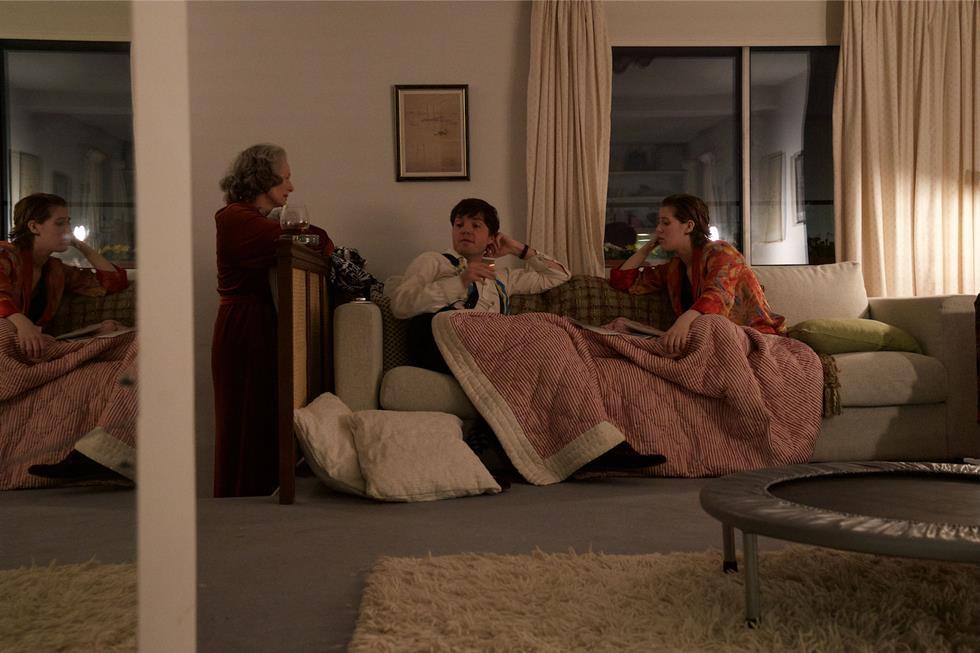
I’m a huge, huge fan of sound design and so many of my friends are sound designers. That’s one thing I always appreciate. Thanks to so many sound designers whom I know, through them I have become even more attuned to sound design and sound editing. So when I find a film like this that uses ambiance instead of just stuffing it with music, with instrumental score, I am just so thrilled by it because that says so much more about the lives that we’re watching and the time that we’re in. You use sound so perfectly here as another layer of storytelling that just adds to the whole vision of what we’re seeing and feeling. It’s so beautifully done.
Thank you. Jovan would be very pleased to hear this too. He worked very hard to find that atmosphere. It’s a fascinating process. I love that side of it. I ‘m very aware of it when I’m watching other people’s films and I find sometimes if it’s a very dominant score, it’s frustrating because I want to hear the sounds behind the score. So music, if used too heavy-handedly can just spoil so much and then I find you can’t find, as a viewer, you can’t find your space within a film because the music is coming at you and it’s so dominating when used in the wrong way.
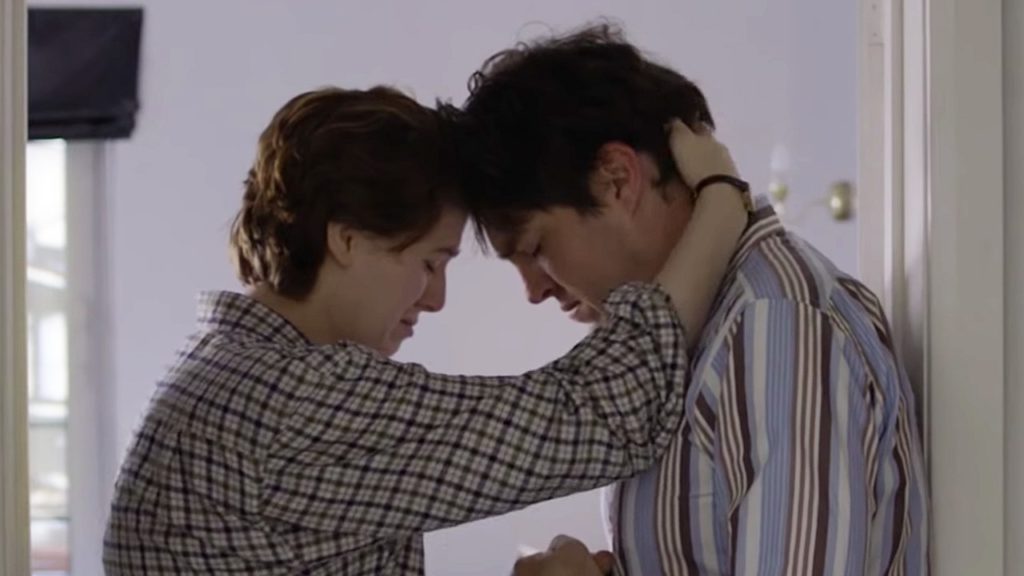
Before I let you go, Joanna, I have to ask, what did you learn about yourself, as a director, in making THE SOUVENIR that you can now take forward into your next project, your future projects?
My future project is the second project of THE SOUVENIR, so maybe I’ll be able to step back when I finish that because I feel very much like I’m almost in the middle of shooting the first one. I’m sort of between the two films. I haven’t really given myself time to think. Maybe I’ll be able to answer that when I’ve made the second part. You’ve got me there! [laughing] In the background, not literally, but of this conversation, is me and my anticipation of the shoots for the second part which is in three weeks time. I’m actually trying to keep inside the bubble of the story. There’s literally not been time to step back and I’m sort of reluctant to step back or out because we’re only halfway through.
Well, THE SOUVENIR is glorious, and I can’t wait for the second half, Joanna.
Thank you! I love to hear your enthusiasm! It boosts me for the shoot in three weeks time.
by debbie elias, exclusive interview 05/11/2019











